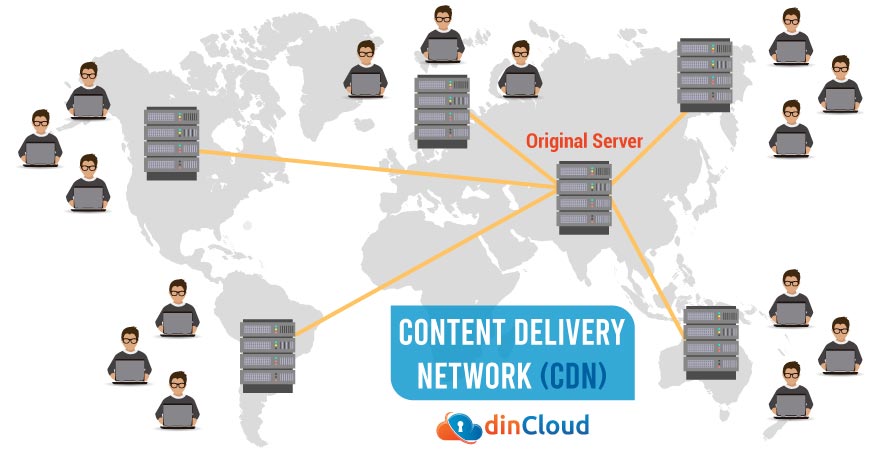The modern internet user is very impatient and does not tolerate delays in any form. So, if you are a website owner, content creator or an e-commerce establishment, an efficiently performing website will be key to retaining visitors and increasing revenues.

Definition of CDN
Content Delivery Network (CDN) is a strategically placed network of highly efficient servers. These will work together in close coordination to speed up the delivery of your online content to visitors, thus reducing bounce rate and improving revenue.
Also Read:
- Why DaaS Solutions by dinCloud are the Best Choice for You?
- How is dinCloud Accelerating the Rate of Cloud Adoption?
How Does a CDN Work?
To achieve this goal, an efficient CDN solution will rely on multiple tools that will work closely together. The content whose delivery you can optimize through a CDN generally includes HTML pages, javascript files, images and videos etc.
A CDN will maintain key assets of your online content in cached form at its strategically placed global servers. The intelligent software of the CDN solution will analyze the geographical location of each visitor and serve cached versions from the nearest server.
Difference b/w CDN and Web Host
This is one issue that confuses many people about CDN. A common misperception about CDN is that it is the replacement for your traditional Web Hosting Provider. Well, that is not the case and the role of your website hosting entity will remain as such.
Benefits of Content Delivery Network (CDN)
Well, a CDN can potentially deliver multiple advantages but this will depend on many factors. One factor will be the level of services your CDN provider offers in the first place. Then, you will have to decide which of these features you want and are willing to pay for.
Below are a few benefits you can enjoy by implementing a quality Content Deliver Network (CDN) solution over your website or some other online content.
Shorter Website Load Time
The time it takes your website or any other online content to become available to a visitor is known as load time. This is not only a critical component of user experience, this metric can also impact the ranking of your website by various search engines.
By employing a CDN, you will be able to drastically reduce the load times for your website. This will not only improve end user experience for your online visitors, it can also potentially improve your rankings in search engine results (SERPs).
Also Read:
- How to Differentiate Between DaaS, VDI and other Cloud Environments?
- Transition to the Cloud Gaining Momentum as per Recent Study
Lower Bandwidth Costs
Each time data is queried from your origin server or hosting provider, it is highly likely to accompany bandwidth costs. A CDN can notably reduce this cost by maintaining cached versions of your online content. This way, origin server will not be involved each time.
Prompt Content Delivery
A CDN will immensely optimize the time it takes to load your website and its supporting content. This prompt delivery of content to visitors will ultimately result in highly satisfied visitors that are more likely to return to your website or bookmark it for future use.
Lower Redundancy
Issues like hardware failure are an inescapable reality of the internet. With a CDN, you have multiple servers where your online content is cached. Even if there is some issue at your hosting provider or any of the CDN servers, content will still be served uninterrupted.
Higher Satisfaction and Revenue Growth
If you look at CDN from a commercial standpoint, it makes this solution an even better proposition. Satisfied online visitors mean more return visitors and referrals. This can ultimately boost your revenue through ads on your website or more online customers.
Improved Website Security
This benefit will vary with each CDN provider but in theory, you may also be able to improve website security. CDNs employ highly intelligent solutions that detect potentially malicious traffic and prevents it from disrupting the normal operation of your website.
Also Read:
- Things You Need to Know About Desktop and App Virtualization
- 5 Compelling Reasons to Adopt Desktop as a Service – DaaS
Conclusion – You Need a CDN
In view of the above discussion, we can safely conclude that a Content Delivery Network (CDN) is a worthwhile investment. The only thing is that you first need to understand the exact needs for the type of online content you create.
The next key step in the process will be selecting the right CDN provider who not only has the requisite tools you desire, but also offers them at a reasonable price. Lastly, the quality of support your CDN provider gives should also be a major consideration.


